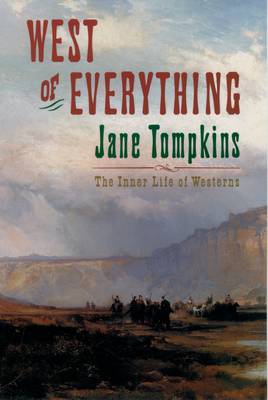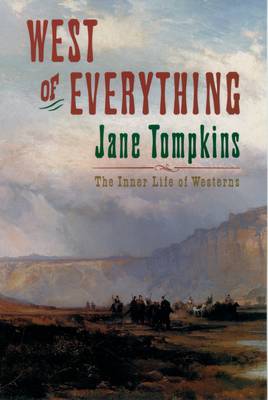
Door een staking bij bpost kan je online bestelling op dit moment iets langer onderweg zijn dan voorzien. Dringend iets nodig? Onze winkels ontvangen jou met open armen!
- Afhalen na 1 uur in een winkel met voorraad
- Gratis thuislevering in België vanaf € 30
- Ruim aanbod met 7 miljoen producten
Door een staking bij bpost kan je online bestelling op dit moment iets langer onderweg zijn dan voorzien. Dringend iets nodig? Onze winkels ontvangen jou met open armen!
- Afhalen na 1 uur in een winkel met voorraad
- Gratis thuislevering in België vanaf € 30
- Ruim aanbod met 7 miljoen producten
Zoeken
€ 49,45
+ 98 punten
Uitvoering
Omschrijving
A leading figure in the debate over the literary canon, Jane Tompkins was one of the first to point to the ongoing relevance of popular women's fiction in the 19th century, long overlooked or scorned by literary critics. Now, in West of Everything, Tompkins shows how popular novels and films of the American west have shaped the emotional lives of people in our time.
Into this world full of violence and manly courage, the world of John Wayne and Louis L'Amour, Tompkins takes her readers, letting them feel what the hero feels, endure what he endures. Writing with sympathy, insight, and respect, she probes the main elements of the Western--its preoccupation with death, its barren landscapes, galloping horses, hard-bitten men and marginalized women--revealing the view of reality and code of behavior these features contain. She considers the Western hero's attraction to pain, his fear of women and language, his desire to dominate the environment--and to merge with it. In fact, Tompkins argues, for better or worse Westerns have taught us all--men especially--how to behave.
It was as a reaction against popular women's novels and women's invasion of the public sphere that Westerns originated, Tompkins maintains. With Westerns, men were reclaiming cultural territory, countering the inwardness, spirituality, and domesticity of the sentimental writers, with a rough and tumble, secular, man-centered world. Tompkins brings these insights to bear in considering film classics such as Red River and Lonely Are the Brave, and novels such as Louis L'Amour's Last of the Breed and Owen Wister's The Virginian. In one of the most moving chapters (chosen for Best American Essays of 1991), Tompkins shows how the life of Buffalo Bill Cody, killer of Native Americans and charismatic star of the Wild West show, evokes the contradictory feelings which the Western typically elicits--horror and fascination with violence, but also love and respect for the romantic ideal of the cowboy.
Whether interpreting a photograph of John Wayne of meditating on the slaughter of cattle, Jane Tompkins writes with humor, compassion, and a provocative intellect. Her book will appeal to many Americans who read or watch Westerns, and to all those interested in a serious approach to popular culture.
Into this world full of violence and manly courage, the world of John Wayne and Louis L'Amour, Tompkins takes her readers, letting them feel what the hero feels, endure what he endures. Writing with sympathy, insight, and respect, she probes the main elements of the Western--its preoccupation with death, its barren landscapes, galloping horses, hard-bitten men and marginalized women--revealing the view of reality and code of behavior these features contain. She considers the Western hero's attraction to pain, his fear of women and language, his desire to dominate the environment--and to merge with it. In fact, Tompkins argues, for better or worse Westerns have taught us all--men especially--how to behave.
It was as a reaction against popular women's novels and women's invasion of the public sphere that Westerns originated, Tompkins maintains. With Westerns, men were reclaiming cultural territory, countering the inwardness, spirituality, and domesticity of the sentimental writers, with a rough and tumble, secular, man-centered world. Tompkins brings these insights to bear in considering film classics such as Red River and Lonely Are the Brave, and novels such as Louis L'Amour's Last of the Breed and Owen Wister's The Virginian. In one of the most moving chapters (chosen for Best American Essays of 1991), Tompkins shows how the life of Buffalo Bill Cody, killer of Native Americans and charismatic star of the Wild West show, evokes the contradictory feelings which the Western typically elicits--horror and fascination with violence, but also love and respect for the romantic ideal of the cowboy.
Whether interpreting a photograph of John Wayne of meditating on the slaughter of cattle, Jane Tompkins writes with humor, compassion, and a provocative intellect. Her book will appeal to many Americans who read or watch Westerns, and to all those interested in a serious approach to popular culture.
Specificaties
Betrokkenen
- Auteur(s):
- Uitgeverij:
Inhoud
- Aantal bladzijden:
- 272
- Taal:
- Engels
- Reeks:
Eigenschappen
- Productcode (EAN):
- 9780195082685
- Verschijningsdatum:
- 29/04/1993
- Uitvoering:
- Paperback
- Formaat:
- Trade paperback (VS)
- Afmetingen:
- 138 mm x 219 mm
- Gewicht:
- 335 g

Alleen bij Standaard Boekhandel
+ 98 punten op je klantenkaart van Standaard Boekhandel
Beoordelingen
We publiceren alleen reviews die voldoen aan de voorwaarden voor reviews. Bekijk onze voorwaarden voor reviews.











